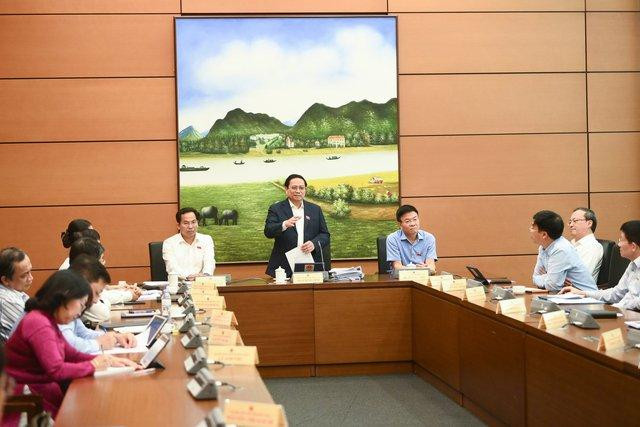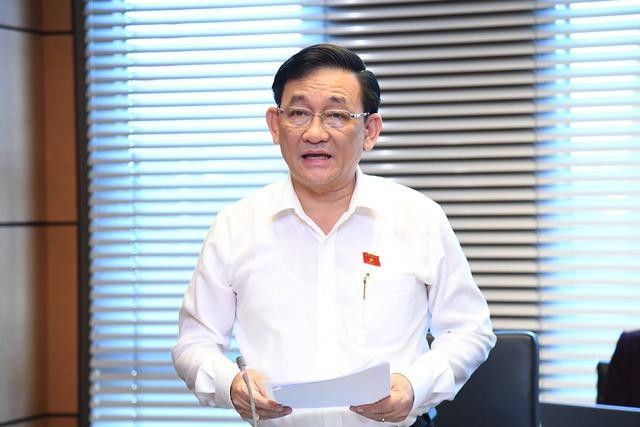It is necessary to immediately apply the statute of limitations for administrative disciplinary action in line with Party discipline.
At the 4th session, on the afternoon of October 24, the National Assembly discussed in groups the draft Law on Anti-Money Laundering (amended); the draft Resolution of the National Assembly on the statute of limitations for disciplinary action against cadres, civil servants and public employees.
 |
Prime Minister Pham Minh Chinh agreed with many National Assembly deputies that virtual currencies in Vietnam have not been recognized but are still being traded and used, so it is necessary to study sanctions to prevent and combat money laundering. Photo: VGP/Nguyen Hoang |
There needs to be sanctions on virtual currency.anti-money laundering
Delegate Vuong Quoc Thang (Quang Nam Delegation) said that the issue of digital currency and digital assets is a technology product that has appeared very popularly in recent times.
Cryptocurrencies and digital assets are easily exchanged globally. Therefore, cryptocurrencies and digital assets are a channel for criminals to launder money and finance terrorism. This issue was raised in the Department of Justice's 255 Report dated October 29, 2018.
Reports have mentioned that cryptocurrencies and digital assets are at risk of being abused for illegal activities, including money laundering and terrorist financing. Therefore, it is necessary to research and build a legal framework to manage digital assets and digital currencies and prevent risks.
Also discussing this issue, delegate Nguyen Thanh Trung (Yen Bai delegation) agreed with the Government's submission and the Economic Committee's review report. Mr. Trung said that along with the development of socio-economy, especially digital technology, money laundering tricks take place in many forms, through real estate investment activities, capital contribution, taking advantage of the stock market, etc.
In addition, there are other new forms emerging such as online business under the guise of investing in virtual currency, digital currency, etc., leading to difficulties in management. Therefore, Mr. Trung believes that it is necessary to amend the law to overcome the shortcomings and limitations in the implementation process. At the same time, it covers newly emerging money laundering behaviors, in accordance with international commitments.
Regarding the reporting period for large value transactions that must be reported and reporting electronic money transfer transactions within 2 days, Mr. Trung said that this period is relatively short. Reporting entities need time to collect information and make assessments. Therefore, the delegate proposed to extend the period from 3-5 days.
Regarding the Law on Anti-Money Laundering (amended), according to Minister of Justice Le Thanh Long, the scope and regulatory acts in this draft law need to be approached in a way that the regulations on incoming money meet the minimum requirements, but outgoing money needs to be strict. Article 4 mentions that the reporting subjects in the business sector are still broad and need additional regulations, because there are industries that are large in both number of transactions and business scale, even family businesses can participate in these industries. Therefore, the Minister suggested that it is necessary to add more conditions such as on the scale and type of business, or anti-money laundering measures.
Regarding warning signs of suspicious transactions, according to the Minister, it is necessary to consider further separating specific roles and tasks for banks, life insurance, payments, etc. Because these signs will change according to the socio-economic development process and the needs of the country in each period.
The Minister suggested careful calculation. If not certain and to ensure a certain flexibility, the above issues should be assigned to the Government for convenient regulation, and there should be no attempt to "rigidly legislate".
Discussing this issue, Prime Minister Pham Minh Chinh agreed with many opinions of National Assembly deputies that virtual currency in Vietnam has not been recognized but in reality there are still transactions and uses, so it is necessary to study sanctions to prevent and combat money laundering.
"We have not recognized it yet, but in reality, there are transactions. When it is not recognized by law, there must be a suitable way to handle it," the Prime Minister said, suggesting that the Government should issue regulations to respond to the rapidly changing reality.

'Increase basic salary as soon as possible, can be applied from January 1, 2023'
23/10/2022
Administrative discipline is consistent with party discipline.
Discussing the statute of limitations for disciplinary action against cadres, civil servants and public employees, delegate Pham Van Hoa (Dong Thap Delegation) said that there have been many cases of disciplinary action by the Party but then after a long period of time, no disciplinary action by the government.
Mr. Hoa gave an example of removing the Deputy Secretary but the position of Chairman of the People's Committee remained intact. Therefore, these people still hold the position of Chairman of the People's Committee. Therefore, the regulation on the statute of limitations for handling party members in relation to administrative handling in the past has not been consistent and is still problematic.
Although the Party has been dealt with strictly, the government has been very slow, even prolonging the statute of limitations. If the statute of limitations is too low, disciplinary action will not be possible. In the past, there have been localities, units, and agencies where this situation has occurred.
For violations that require disciplinary action in the form of reprimand, current regulations clearly state that the statute of limitations for party discipline is 5 years; the statute of limitations for administrative disciplinary action is 2 years.
With the warning level of discipline, the statute of limitations for Party discipline is 10 years, for administrative discipline is 5 years. Because of this difference, in reality, there have been a number of cases where Party discipline has been applied, but when considering administrative discipline, the agencies recommended not to apply discipline because the statute of limitations has expired according to the law. This affects the strict implementation of the regulation that "Party discipline does not replace administrative discipline or union discipline; within 30 days from the date of announcement of the Party discipline decision, administrative discipline must be applied". At the same time, this is also not in line with the Party's policy of strict discipline, "no forbidden zones, no exceptions".
Therefore, Mr. Hoa agreed with the application of a 5-year disciplinary statute of limitations for violations by cadres, civil servants and public employees that require disciplinary action in the form of a reprimand; 10 years for violations that require disciplinary action in the form of a warning or higher.
Consider the time of explanation
Discussing in groups about the draft Resolution promulgating the Rules of the National Assembly Session (amended) on the afternoon of October 24, delegates said that it is necessary to clarify the absence time of delegates at the Sessions and consider regulations on the time and number of times delegates can speak at the meeting.
One of the topics that delegates mentioned frequently was questioning and debate. Delegate Nguyen Manh Hung (Can Tho) suggested that the responsibilities of delegates to research documents and express their opinions should be more clearly defined. Delegate Tran Thi Hong Thanh (Ninh Binh) also agreed with this view. She suggested that there should be a mechanism to monitor and evaluate the quality of delegates' opinions.
Deputy Hung said that the regulation of 1 minute for each question of the delegates is a bit short. “The time is short so delegates ask general questions. Asking a minister or other government member in just 1 minute is difficult. The important thing is whether the quality of the questions is good or not. Each question should be 2 minutes long so that there can be more guidance and deeper questions,” Mr. Hung suggested.
Discussing this issue, Prime Minister Pham Minh Chinh said: There needs to be discussion and time for accountability. Because accountability also means strengthening responsibility and improving the quality of the Government's accountability to the National Assembly.
According to the Prime Minister, agencies submitting bills and drafts should be reminded to try to meet the deadline and improve quality. "If the deadline is met but the quality is not high, it cannot be guaranteed. We should calculate appropriately for quality," said the Prime Minister.
The Prime Minister also said that the time for asking questions should be considered more carefully. Regarding the question and answer session, the Prime Minister also said that it should not be "too rigid", but should be regulated to 3 to 4 minutes, for example.
"A complex, difficult, sensitive issue… sometimes needs more time," said the Prime Minister.
The Prime Minister also said that the delegates' requests for leave from meetings should be decentralized. If it is two days, who should they report to? If it is three or four days, who should they report to? Many comrades are busy with overseas work programs, or are sick, for example, so it should be decentralized. "If everyone has to go to the Secretary General of the National Assembly, the Chairman of the National Assembly, etc., then the feasibility is not high."


